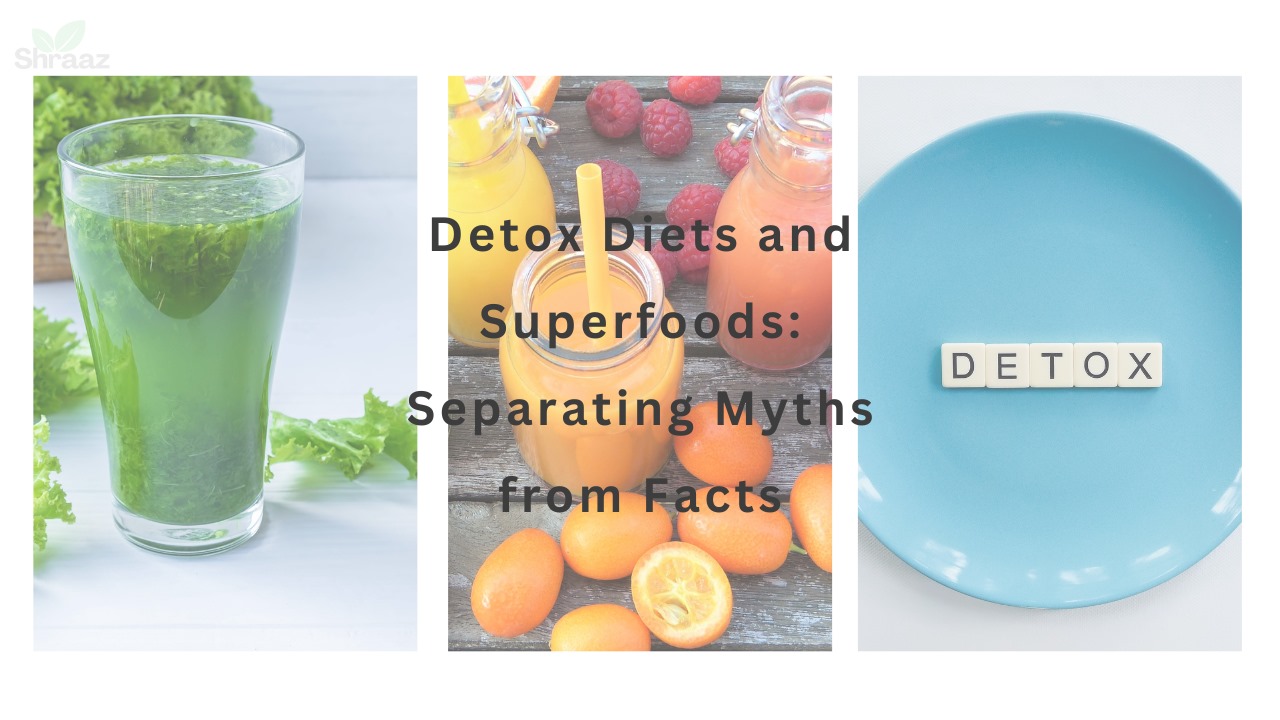Introduction to Detox Diets and Superfoods
In recent years, detox diets and superfoods have become buzzwords in the health and wellness space, promising everything from rapid weight loss to enhanced energy and immunity. While these terms are widely marketed, the actual health benefits they claim often spark debate among experts. This article will break down the science behind detox diets and superfoods, analyzing their purported health benefits and potential risks, while also offering practical guidance for incorporating them into a balanced lifestyle.
With increasing access to information and new trends constantly emerging, it’s important to take a closer look at whether detox diets and superfoods truly live up to their hype or are simply marketing tools designed to exploit consumers.
Understanding Detox Diets
What is a Detox Diet?
A detox diet typically refers to a short-term dietary intervention that claims to rid the body of toxins, improve digestion, and promote weight loss. Detox diets often involve specific eating patterns, including juice cleanses, fasting, and restrictive diets, usually lasting anywhere from a few days to a couple of weeks.
The idea of detox diets hinges on the assumption that the body accumulates harmful substances over time due to poor diet, environmental pollutants, and chemical exposure. Detox diets promise to clear these toxins, supposedly leading to improved health, clearer skin, enhanced energy, and even mental clarity.
Common Types of Detox Diets:
- Juice cleanses: Consuming only fruit and vegetable juices for a set period (e.g., 3–7 days).
- Water fasting: Drinking only water for a prescribed duration.
- Raw food detox: Eating only uncooked, unprocessed plant-based foods.
- Herbal detox: Using teas or supplements that claim to stimulate detoxification organs like the liver and kidneys.
However, the body naturally detoxifies itself through its systems, primarily the liver and kidneys. This brings into question the need for extreme diets that restrict calories or certain food groups.
How Detoxification Works in the Body
The human body has a sophisticated detoxification system in place, involving several organs that continuously remove harmful substances.
Key Organs in the Body’s Detoxification System:
- Liver: The primary organ for filtering blood and metabolizing harmful substances.
- Kidneys: Responsible for removing waste products and excess substances from the bloodstream through urine.
- Lungs: Expel carbon dioxide and other airborne toxins.
- Skin: Eliminates waste through sweat.
- Colon: Removes solid waste and toxins from the digestive system.
Detox diets generally ignore the fact that these organs work constantly to remove toxins and that, in most healthy individuals, they function efficiently without any special interventions.
Popular Detox Diets
- Juice Cleanses
- Master Cleanse: A lemonade-based detox popularized by celebrities.
- Green Juice Detox: Focuses on juicing leafy greens like spinach, kale, and cucumber.
- Fasting Detoxes
- Water Fasting: Complete abstinence from food with only water intake, which may pose risks of nutrient deficiencies.
- Intermittent Fasting: Alternating periods of eating and fasting, believed to give digestive organs time to “reset.”
- Raw Food Detox
- Focuses on unprocessed plant-based foods to encourage natural detoxification.
- Commercial Detox Products
- Detox teas and supplements often claim to enhance liver function, flush toxins, and aid in weight loss. However, many of these products contain laxatives and diuretics, which may cause more harm than good in the long run.
Superfoods: Nature’s Powerhouses
What Are Superfoods?
Superfoods are nutrient-dense foods believed to offer exceptional health benefits due to their high concentrations of vitamins, minerals, antioxidants, and other bioactive compounds. These foods are often marketed as being able to improve overall health, prevent diseases, and even enhance longevity.
While there is no official medical or scientific classification for what qualifies as a “superfood,” they are generally rich in nutrients, low in calories, and associated with reduced risk of chronic diseases.
Popular Superfoods and Their Benefits
- Green Superfoods
- Kale: High in vitamin K, vitamin C, and fiber. Known for its anti-inflammatory and antioxidant properties.
- Spinach: A great source of iron, magnesium, and beta carotene, which supports immune function and eye health.
- Spirulina: A type of algae that provides a concentrated source of protein, B vitamins, and antioxidants.
- Berries
- Blueberries: Packed with antioxidants, particularly anthocyanins, which may help reduce oxidative stress.
- Acai Berries: Claimed to support heart health and boost cognitive function due to their high antioxidant levels.
- Goji Berries: High in vitamin A, believed to support vision and skin health.
- Seeds and Nuts
- Chia Seeds: Chia Seed is rich in omega-3 fatty acids, fiber, and protein. Often added to smoothies for an energy boost.
- Flaxseeds: High in lignans and omega-3, known to reduce cholesterol and support digestive health.
- Exotic Superfoods
- Maca Root: A Peruvian plant used to enhance energy, endurance, and hormone balance.
- Matcha: A powdered green tea high in catechins, which have powerful antioxidant effects.
- Turmeric: Contains curcumin, an anti-inflammatory compound, which may reduce arthritis symptoms and improve brain function.
While these foods do offer concentrated nutrients, it’s important to remember that no single food can provide all the nutrients required for optimal health.
Health Claims: Fact or Fiction?
Detox Diet Claims
Proponents of detox diets claim that removing toxins from the body, in these diets can lead to the:
- Weight loss: Rapid, but often due to water and muscle loss rather than fat reduction.
- Improved digestion: Some diets promote gut health by encouraging the consumption of fiber-rich, plant-based foods.
- Increased energy: Supporters say they feel energized after a detox due to lighter food consumption and hydration.
However, scientific studies suggest these benefits are often short-term and not sustainable. Detox diets may cause more harm than good, leading to fatigue, nutrient deficiencies, and muscle loss.
Superfood Health Claims
Superfoods are often marketed as miracle foods that can prevent diseases like cancer, heart disease, and diabetes. However, while they are nutrient-dense and beneficial for health, their effects are not as extraordinary as often portrayed.
For instance, blueberries are high in antioxidants, which may help reduce the risk of chronic diseases, but they won’t single-handedly cure ailments. Superfoods are best when included as part of a balanced diet, rather than relied upon as “magic bullets.”
Critical Perspectives from Nutritionists and Doctors
Many health professionals argue that detox diets are unnecessary because the body naturally detoxifies itself. Extreme forms of detox can cause nutrient deficiencies and put strain on the liver and kidneys, rather than help them. Similarly, while superfoods can boost nutrient intake, they shouldn’t replace the variety required for balanced nutrition.
Potential Benefits of Detox Diets and Superfoods
Short-term Results
For detox diets, short-term results like weight loss and improved hydration are often reported. These are mainly due to calorie restriction and increased water consumption rather than any specific detox process.
Long-term Benefits of Superfoods
Regular consumption of superfoods like leafy greens, berries, and seeds can:
- Lower the risk of heart disease due to their high antioxidant content.
- Improve digestion, thanks to their fiber and nutrient density.
- Support mental clarity and energy levels due to essential vitamins and minerals.
Enhanced Mind-Body Connection
Detox diets, particularly those involving mindfulness and conscious eating, may help some individuals reconnect with their bodies. The act of taking a break from processed foods and focusing on whole, nutrient-dense foods may also foster a positive relationship with food.
Risks and Limitations
Detox Diet Risks
Detox diets, particularly those involving fasting or extreme restriction, can result in:
- Nutrient deficiencies: Lack of essential vitamins and minerals from restricted food groups.
- Muscle loss: Prolonged fasting or inadequate protein intake may cause muscle breakdown.
- Electrolyte imbalances: Diuretic-based detoxes may cause dangerous shifts in sodium and potassium levels, leading to fatigue, confusion, or even heart problems.
Superfood Myths and Overconsumption
While superfoods are nutrient-dense, overconsumption can be harmful. For example, excessive spirulina may lead to digestive upset or heavy metal exposure if sourced from contaminated waters. Similarly, large amounts of turmeric may interfere with blood clotting.
Commercial Detox Products
Many detox teas and supplements are sold with misleading claims. Products with laxatives or diuretics can lead to dehydration, dependency, and imbalances in gut health.
Science-Based Alternatives
A Balanced Diet vs. Detox Diets
A well-balanced diet rich in fruits, vegetables, whole grains, and lean proteins is a more sustainable approach to supporting the body’s natural detoxification systems. Hydration, regular exercise, and adequate sleep also play essential roles in maintaining overall health.
Incorporating Superfoods Into a Healthy Diet
Rather than focusing on specific superfoods, aim for a varied diet that includes a wide range of nutrient-dense options. For instance, adding chia seeds to smoothies, using turmeric in cooking, and enjoying a mix of berries in oatmeal can provide consistent, long-term benefits.
Sustainable Health Practices
For lasting health improvements, consider adopting lifestyle habits such as:
- Eating a variety of whole foods: Ensuring a balanced intake of macronutrients and micronutrients.
- Regular physical activity: Helping the body maintain muscle mass and support metabolism.
- Adequate hydration: Ensuring that the kidneys and liver function optimally.
Conclusion
Summing Up the Pros and Cons
While detox diets and superfoods are widely marketed for their health benefits, it’s essential to separate fact from fiction. Detox diets may provide temporary results, but they often come with risks and lack scientific backing. Superfoods, though nutrient-rich, are best enjoyed as part of a balanced and varied diet.
Practical Advice for Readers
Instead of relying on detoxes or specific superfoods, focus on long-term, sustainable changes to your overall diet and lifestyle. Incorporate a variety of fruits, vegetables, lean proteins, and whole grains, and consult a healthcare provider before making drastic dietary changes.
Final Thoughts
Detox diets and superfoods may have their place in the wellness industry, but true health comes from balance, variety, and consistency in lifestyle choices.
References/Further Reading
- Detox Diets: The Risks and Benefits
- Dyer, O. (2019). “Detox diets: Do they work?” British Medical Journal.
- Superfoods: Nutritional Powerhouses
- Smith, A. J. (2020). “The Science of Superfoods: What Are They Really?” Nutrients Journal.
- Nutrition and Detoxification
- D’Adamo, P. (2018). “Detox diets: What the science says.” Nutrition Today, 53(4), 181-187.
- Myths About Superfoods
- Harris, J. L. (2021). “Superfoods: The Myths and the Facts.” American Journal of Lifestyle Medicine.
- The Body’s Natural Detoxification Processes
- Intermittent Fasting and Detoxification
- Longo, V. D., & Mattson, M. P. (2014). “Fasting: Molecular Mechanisms and Clinical Applications.” Cell Metabolism, 19(2), 181-192. Link to article.
- Practical Guidelines for a Balanced Diet
FAQs
1. What are detox diets, and do they actually work?
Detox diets are short-term dietary plans aimed at eliminating toxins from the body. While proponents claim they lead to benefits like weight loss and improved energy, the scientific evidence supporting these claims is limited. Most health experts argue that the body is capable of detoxifying itself through its natural processes.
2. Can I lose weight on a detox diet?
You may experience weight loss on a detox diet, but this is often due to water loss and calorie restriction rather than fat loss. Long-term weight loss is best achieved through a balanced diet and regular exercise rather than short-term detox plans.
3. Are superfoods worth the hype?
Superfoods can be beneficial as part of a balanced diet due to their high nutrient density. However, no single food can provide all the nutrients your body needs. A varied diet is essential for overall health.
4. How often should I do a detox diet?
Health professionals generally do not recommend regular detox diets, as they can lead to nutrient deficiencies and other health risks. Instead, focus on sustainable eating habits that support your body’s natural detoxification processes.
5. What is the best way to incorporate superfoods into my diet?
Incorporate superfoods by adding them to your meals in moderation. For example, add chia seeds to smoothies, enjoy berries with breakfast, or use turmeric in cooking. A diverse diet with various nutrient sources is key to maintaining health.
6. What are the risks associated with detox diets?
Detox diets can lead to risks such as nutrient deficiencies, muscle loss, fatigue, and imbalances in electrolytes. Always consult with a healthcare provider before starting any extreme diet, especially if you have underlying health conditions.
7. Is there scientific evidence to support the health benefits of superfoods?
While some studies suggest the potential benefits of superfoods, many claims are based on limited research. Superfoods can contribute to a healthy diet, but the most significant health benefits come from an overall balanced diet.




